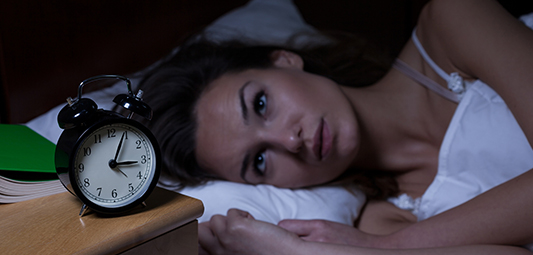
When your natural pattern of sleep is disturbed you experience insomnia – a sense of having had inadequate quantity or quality of sleep.
Almost everyone experiences brief bouts of insomnia, often caused by stress or worries, physical discomfort, medication effects or a change in your sleep schedule.
These acute episodes of insomnia last only a few nights and your sleep schedule usually return to normal after the situations that have caused the sleep disruption have been resolved.
If a person experiences insomnia for a month or more, some form of treatment is typically needed to restore the person’s sleep back to normal.
Covid19 is causing sleep disturbances for many people as they become anxious and stressed. See Covid19 page.
Insomnia can be divided into two basic categories – Acute Insomnia and Chronic Insomnia.
Acute Insomnia
This refers to a sleep disturbance that occurs without any specific underlying condition that causes insomnia.
Individuals with acute insomnia experience a sleep problem without having any medical or psychiatric condition that is the cause of it. Acute insomnia is mostly caused by forming faulty sleeping habits.
Chronic Insomnia
This differs from acute insomnia in that a specific condition can be identified as the cause of the sleep problem and should be evaluated by your family doctor or naturopath. Examples of chronic insomnia are;
Sleep Apnoea
This is a sleep disorder caused by difficulty breathing during sleep. Persistent, loud snoring and frequent long pauses in breathing during sleep, followed by choking or gasping for breath are the main signs of sleep apnoea.
Restless Leg Syndrome
This is a sleep disorder characterised by unpleasant sensations (creeping, burning, itching, pulling or tugging) in the legs or feet, occurring mostly in the evening and at night. Moving the legs around tends to relieve the unpleasant sensation temporarily.
Sleep-Wake Schedule or Circadian Rhythm Disorder
This is a sleep disorder caused by having sleep-wake schedules that do not match up with your natural sleep schedule. People who work night shift may suffer from this problem.
Insomnia caused by medical conditions
Many common medical problems and the drugs that treat them can cause insomnia, including allergies, arthritis, heart disease, hypertension, asthma, Parkinson’s disease, attention deficit hyperactivity disorder or hyperthyroidism to name a few.
Physical Discomfort
(e.g. Chronic pain) may also cause problems sleeping.
Substance use or withdrawal
Many drugs and medications can cause sleep disturbances, either while taking them or while withdrawing from them. Alcohol, stimulants, sedatives and even long-term use of sleep medications can cause insomnia.
Insomnia due to an emotional problem
Insomnia can be a symptom of a number of emotional difficulties. If you find that you worry excessively about numerous minor matters or if you have experienced sadness or a loss of interest in activities for a number of weeks consult a Psychotherapist or Counsellor for assistance.
Healing can be of great benefit to reduce stress and lift negative energy, helping to relax the sufferer and in turn assist them in finding a pattern of restful sleep.
For Your Body
Relaxation:
Being physically relaxed before bed has been shown to improve sleep. For many people, all that is required is to do a relaxing activity for an hour or two before bed
(take a bath or read a book for example).
Some people, however, have difficulty relaxing before bed. Listed below are proven methods to help you relax.
Visual Imagery Relaxation:
Imagine yourself in peaceful and comfortable situations apart from your daily life where you leave your cares and worries behind. Preferably, listen to a guided sleep meditation to help you start your new routine, or imagine taking a walk in a beautiful peaceful environment.
Body Focus:
Muscle relaxation is a technique where you bring your attention to the different parts of your body, you can work from one end of your body to the other. For some people, it helps if you tense, hold and then relax your muscles, one muscle group at a time.
Some people prefer this form of relaxation because it provides them with something to do as they relax and holds their attention better than the other types of relaxation.
Important Tips
Improving your sleep habits and your sleep environment.
- Avoid stimulants such as caffeine 4-6 hours before bedtime ideally not after 2pm, also try and quit smoking. Nicotine close to bedtime can cause poor sleep.
- Avoid drinking alcohol 4-6 hours before going to bed.
- Eat a light, easily digestible snack before bed but avoid large meals before bedtime.
- Avoid exercising within 3-4 hours of bedtime.
- Give yourself a quiet period or calm time for at least one or two hours before bed and do not watch the news before retiring for the night. If you wake and are laying there for more than 30 minutes unable to sleep, get up and do something boring.
- Improve the comfort of your bed if needed.
- Make your bedroom a place only to sleep and make love such as;
a. Reduce noise and disruptions, remove T.V,
b. Computer and work materials e.t.c.
c. Only use your bedroom for sleep, sex, relaxation or meditation,
d. Reduce light in the bedroom, keep it dark and cool.
e. Maintain a regular temperature,
f. Develop regular “pre-sleep” delights, such as;
g. Take a warm bath or shower
h. Sex with someone you love
i. I Deep breathing exercises, body focus meditation
j. Massage your body
k. Drink some soothing herbal tea such as; Chamomile, Lemon Balm, Passionflower or Valarium. - Use fragrances and aromatic oils to burn such as;
Basil, Camphor, Chamomile, lavender, marjoram, neroli, rose, sandalwood or ylang-ylang (never leave burning candles unattended). For centuries fragrances have been used to induce certain moods. All the above have been found to have relaxing and soothing effects on the nervous system. Have an oil burner in your bedroom and chose a blend that suits you from the list. - Don’t take any naps during the day. Establish a regular time for bed and waking, even on weekends. Only go to bed when your sleepy, get up half-hour earlier than you usually do, this resets the body clock to go to sleep earlier.
- Avoid things that are mentally, emotionally or physically disturbing an hour before bed – that includes watching a dramatic T.V show or the news.
- If stress is part of the problem, take a complete vitamin B complex, it helps feed the nerves. A lack of vitamin B6 can cause insomnia because it is used to form serotonin which aids restful sleep. Good natural sources of B6 include walnuts, meat and fish, fortified breakfast cereals, bananas, potatoes and green vegetables. Also, try oatcakes or porridge. both contain Avena sativa which helps you feel sleepy.
- The Hypothalamus gland in the brain regulates the hormones that make you sleepy. Healing can stimulate this gland to help produce natural sleep hormones.
- If you’re worried about something, be it work or relationships, you should avoid talking about it much at night – this will just make you worry even more. It’s a vicious circle – you’ll only end up getting more worked up and sleeping less. You should talk about your troubles during the day and relax during the evening, go to see a movie, do a hobby or play with your children – anything to wind down and take your mind off what’s bothering you.
- Test your bed by lying on your back and trying to put your fist in the small of your back. If it goes in too easily it’s too soft if it’s too tight the bed is too hard.
- Drinking warm milk with honey in the last thing before bed may help, it contains tryptophan which stimulates the tranquillising brain chemical, serotonin.
- There is a Herbal sleeping aid called Sedonium which includes the herb, Valerian. Sedonium has no side effects and is available from the pharmacy counter at boots, Superdrug and independent Pharmacies nationwide, priced around £5.99 for 30 tablets. Please ask your G.P before starting any course of Herbal treatment and you should consider professional help if your sleeping difficulties persist, not rely on sleeping aids indefinitely.
- Foods containing a substance called tyramine can disrupt your sleep by changing brain chemicals. These foods include chocolate, sauerkraut, bacon, ham, sausage, cheese, aubergine, potato, tomato, peppers, smoked meat and fish.
- New research even suggests many people sleep better without their partner.
For Your Mind
 What is going on in your mind?
What is going on in your mind?
The power of your mind and the quality of your thoughts will affect your life.
In relation to your sleeping difficulties, you may have noticed that when you go to bed and you have been awake for hours, your thoughts are negative and seem to be overwhelming you with worry.
Such as … if I don’t get to sleep tonight again, I will be a mess tomorrow … my work will deteriorate …I won’t be able to cope …oh! I might lose my job …and then how will I pay my mortgage, I will lose my home … I just wish I could end it all.
Waking up in the middle of the night can be difficult too, often personal issues are magnified and seem catastrophic at this time. Issues can seem easier to deal with in the daylight.
If this has been happening to you, it is important to begin some mastery over your thinking. A great way to begin is to have a journal by your bed so that you can write down everything you are worried about before you get into bed.
If you wake at night and catch yourself thinking the same things repeatedly, then hop out of bed and write these down in your journal.
Say to yourself;
“I can’t do anything about these things now, it can wait until tomorrow, or the weekend when I can give some thoughts to my options and solutions”.
Stress and thoughts!
How long do you keep ruminating over your worries and concerns? You know it’s the middle of the night and you are not going to change anything right now.
If you are feeling stuck with your thoughts, it is better to get up, make a cup of relaxing herbal tea, get your journal out and write your concerns down.
If you are feeling really motivated, you could divide the page into two sections, brainstorm as many options as you can and then write down the benefits and the costs of these options.
Waking up in the middle of the night can be a sign of depression or anxiety. Seek some professional assistance with this.
You may have lost your purpose in life or temporarily you are not sure about your life choices. This could relate to relationships, work or personal issues.
Take care of your emotional wellbeing and seek some guidance if need be.
Worrying about not getting enough sleep!
This is definitely the major cause of prolonged insomnia. Lying in bed worrying about not getting enough sleep, feeling tired in the morning or over-sleeping are the most common thoughts reported by people with sleeping difficulties.
Waking up in the middle of the night from a dream, write the dream down in your journal to explore its meaning and possible guidance to your life. Disrupted sleep due to shift work can greatly affect your sleeping pattern.
A guided meditation can help to overcome this in conjunction with practising the pre-sleep delights.
Writing in your journal any worries or thoughts, things that need to be attended to, so you have them recorded and know that you don’t need to keep reminding yourself to do them.
Dreams, nightmares & creative imagination!
Repeated dreams are particularly important to understand. They usually indicate that something in your emotional life needs your attention.
Once you have worked out the personal significance of the dream theme and symbols and possibly made some changes accordingly, you will find the dream will pass.
Strategies for dealing with your thoughts!
How we think about sleep can play an important role in how we deal with sleep difficulties.
For this reason, an essential part of your sleep treatment involves:
- Identifying your thoughts about sleep that tends to make sleeping more difficult and,
- Replacing these thoughts with more helpful thinking.
One technique for examining your thinking is to treat your thoughts as scientific hypotheses or ideas. You may have had certain beliefs about your sleep for a long time.
At this time, you are being asked to consider alternative beliefs and determine which of these beliefs is best supported by the information available to you.
As you pay attention to your thinking about sleep and consider alternatives, you will probably notice two paradoxes to address.
The more important it is to get good night’s sleep, the less you sleep.
Believing that a poor night’s sleep is a disaster, only generates more anxiety and worry about your sleep.
Challenge this thinking and consider alternative thoughts that reduce the importance of sleeping, on the rest of your life (i.e.) “it’s no big deal, I’ll be a little tired and cranky tomorrow but nothing I can’t handle”.
The more you try to control your sleep, the less you sleep.
Sleep is a natural body response. Telling yourself that you MUST sleep and try to force yourself to sleep, only puts pressure on you and makes your sleep worse.
Focusing on what you can control (sleeping habits, routine e.t.c.) and be letting go of what you cannot control, will allow falling to sleep and staying asleep to happen naturally.
Now that you’ve become aware of the thoughts that make your sleep worse and have considered alternative ways of thinking, the next step is to practice these new thoughts.
It is important to review your thinking and beliefs on a regular basis, as it can be easy to fall into old thought habits if you are not actively monitoring your thoughts. Like any new skill, remember it takes practice!
Keep a journal/diary of your sleep-related thoughts and your ideas on how to think differently.
Once you have become accustomed to examining your thoughts, you will find that this is an excellent skill that will prove useful for helping you to approach your sleeping difficulties differently, as well as for learning a healthier approach to other life problems as well.
For the Soul
 Nourishing the soul is as important as nourishing the body with food!
Nourishing the soul is as important as nourishing the body with food!
Activities that nourish the soul can be as simple as spending time enjoying the beauty of nature, going for an enjoyable walk through the park, seeing the sunset, watching waves lapping at the shore.
Practising regular meditation and body focus meditation is cleansing for the emotions and uplifting to the spirit.
Reading poetry or spiritual and uplifting stories before retiring to bed. Listening to beautiful music that is healing and melodic.
Try the Holistic approach to health issues by using some of the many varied types of Alternative / Complementary Therapies available incorporating a Spiritual Theme.





